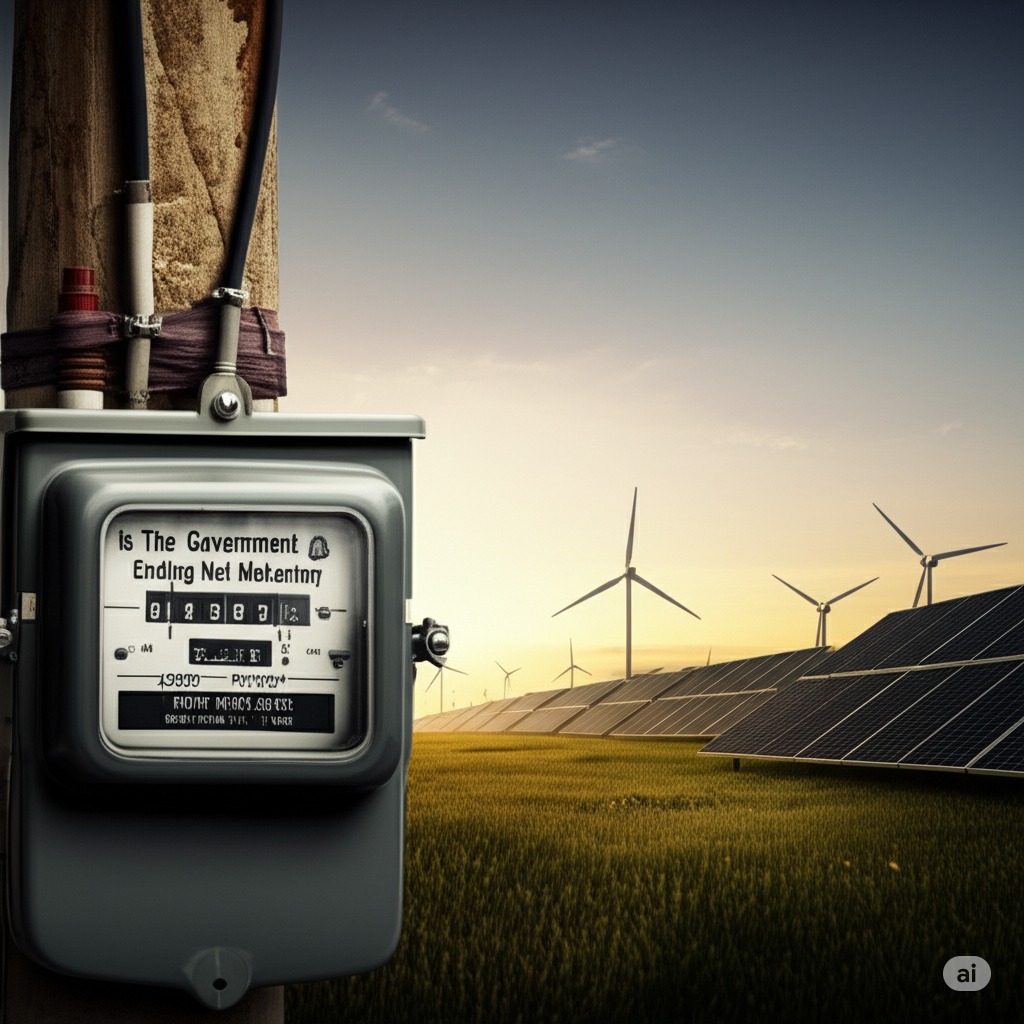
Is the Government Ending Net Metering in Pakistan?
The net metering rumours have finally been addressed by a government official. According to official sources, the government is planning to end net metering in Pakistan. The paperwork has almost been completed and will be sent to the Cabinet Office for formal approval.
The latest renewable energy draft suggests replacing net metering with gross metering to ease the electricity price burden on other consumers.
If the current proposal gets approval from the government, solar users will have to sell all the electricity produced by their solar panels at a much lower fixed rate of around 11.33 RS. almost 3 times lower than the previous rate of 27 R.s per unit.
Various questions are popping up in solar panel consumers’ minds, creating uncertainty and confusion. Though answering all of them could be premature until the government officially announces the new net metering policy in Pakistan.
Still you need to know a lot of things before the bill officially passes.
What You Need to Know About the New Net Metering Proposal
The discussion over reducing the net metering rate or ending it entirely isn’t new. Even last year, the power minister had to issue a clarification stating that the government wasn’t planning to end net metering policies anytime soon.
However, one thing is now clear: net metering will be replaced with gross metering, and the rate will be 60% lower than the previous rates.
Solar panel users who are already selling excess electricity to the grid under the current net metering policy will continue receiving 27 Rs for every unit sold.
What Is the Difference Between Net Metering and Gross Metering in Pakistan?
With net metering, you have the authority to consume the solar-produced electricity first for your own use and then sell the excess electricity to the grid.
However, in gross metering, the process completely changes. It requires you to sell all the electricity produced by your solar panels directly to the grid at a lower rate about one third of the usual rate and then purchase electricity from the grid at much higher rates.
For better understanding, we’ve broken down both in a simple way.
Net Metering (Current System in Pakistan)
- You consume your generated solar power first.
- Any excess electricity is sent to the national grid.
- You get credit for the surplus units exported.
- At the end of the billing period, your bill reflects:
- Units consumed from the grid minus units exported to the grid.
- This system helps reduce your electricity bill substantially.
Gross Metering (Proposed or Possible Future Shift)
- All electricity generated by your solar panels is sent directly to the national grid.
- You do not use your solar power directly.
- You’re paid a fixed rate (usually lower than the retail rate) for every unit exported.
- Meanwhile, your own electricity usage is charged at the standard grid rate.
- Essentially, you sell 100% of your solar generation and buy back 100% of your consumption.
Why Is the Government Keen to Replace Net Metering with Gross Metering?
Officials from the Power Division continuously stress that the current net metering policy has placed an unsustainable financial burden of almost 159 billion on other electricity consumers.
Another report suggests that 103 billion out of this 159 billion is due to the higher purchase rates under the net metering policy.
The government argues that the new gross metering policy will help balance the system and create more equitable cost sharing (Source: SAMA News).
What Should Solar Panel Users Do Now?
- If you still want to save big on your electricity bills and avoid prolonging your ROI period, it is highly recommended not to opt for net metering or gross metering services anymore.
- With the new policy shift, solar panel owners will have to rely entirely on grid power again and at much higher rates as well.
- If all your solar generation is forced to be sold at a low fixed rate (gross metering), it will:
- Not reduce your electricity bills directly.
- Simply make you a small-scale power seller, not a self-power user.
- Monitor NEPRA & Government Updates:
- Keep track of policy changes. Once gross metering becomes mandatory (if it does), small-scale residential users should prioritize off-grid/self-consumption setups with batteries.
You Must Have Some Questions in Mind.
Is Net Metering officially ending in Pakistan, or are these still just rumors?
The federal government is indeed moving to end solar net metering, with the Power Division having finalized a new policy and the ECC already approving amendments.
What is the proposed new buyback rate for solar electricity under Gross Metering, ?
The proposed buyback rate under Gross Metering is around Rs. 10-11.33 per unit, significantly lower than the current Net Metering rate of approximately Rs. 27 per unit.
Will existing Net Metering users be affected by this proposed change, or will their current agreements remain valid?
Existing net metering consumers with valid licenses/agreements will reportedly remain under their current rates and terms until their licenses or agreements expire.
When will gross metering officially replace net metering?
No official date announced yet, but approval is expected within months.
How long will existing net metering contracts remain valid?
For 7 years as per their existing agreement terms.
Why is the government making this change?
The government cites an “unsustainable financial burden” of approximately Rs. 159 billion (Rs. 103 billion from higher purchase rates) on other electricity consumers due to the current net metering system.
What does this mean for the return on investment (ROI) for new solar panel installations in Pakistan if Gross Metering is implemented?
The significantly lower buyback rate under Gross Metering will substantially prolong the ROI period for new solar installations, potentially from 3-4 years to 10-12 years.
The Solar Talks
At SolarTalks, we are dedicated to making solar energy accessible to all. As the only platform in Pakistan offering free consultations, unbiased product and company reviews, and expert insights, we help you make informed decisions about your solar journey.
Useful links
Contact Us
Number
+92 339 1254433
Location
Model Town lahore
Copyright © 2024 Rometheme. All Rights Reserved.
